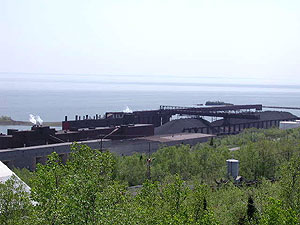|
Photos
More from MPR
Resources
|
July 26, 2005
The Minnesota Pollution Control Agency will decide today whether to issue permits for a proposed iron nugget plant in Hoyt Lakes on Minnesota's Iron Range. The Legislature put the controversial project on a fast track last year by exempting Mesabi Nugget from a full-scale environmental review. Critics are skeptical the proposed permits will do enough to protect the environment, and they'd like more time to study the issues. But the company that wants to build the plant has threatened to take its new technology to some other location where it could get permits faster.
Duluth, Minn. — The mining industry sees iron nuggets as the next generation of technology, one that will make mining more profitable.
Iron nuggets are a more pure form of iron than the taconite that's been the lifeblood of the Iron Range for the last 50 years. Larry Lehtinen built a pilot plant in Silver Bay. He says the new nugget process combines four different steps in steel-making, and that makes it very efficient and very clean.
"You can't help but be less polluting when you take four major steps and convert them into one, and that's what this technology does," says Lehtinen. "You want to make it as clean as possible, and this is absolutely the cleanest way to make iron known to man today."
But this technology has never been tried before. No one is sure exactly how much pollution there will be. So the Pollution Control Agency wants the company to experiment with ways to cut emissions of mercury and other materials that cause acid rain and smog.
But that's not good enough for some critics. Clyde Hanson is a volunteer with the Sierra Club's Mining Without Harm project. Hanson says he's outraged that the proposed air permits would allow the plant to emit up to 75 pounds of mercury a year.
"We're concerned about the level of mercury that's going to be put into the air that ends up in our waters and in our fish," Hanson says. "We're concerned about the particulates and the chemicals that produce smoggy haze."
The smog is also a concern for the National Forest Service. The agency is responsible for trying to keep the air clean over the Boundary Waters Canoe Area Wilderness.
The Forest Service says even now, smog in the Boundary Waters Wilderness has cut visibility to 60% of what it would be without pollution.
Because of that, Minnesota is under a federal order to come up with ways to clear the air over the Boundary Waters.
But even as the state works on a way to reduce smog, it's likely to issue a new permit that would allow more pollution.
Trent Wickman, an air resource specialist with the Forest Service says the state's approach to addressing the Boundary Waters smog problem should take all pollution sources into account. He says that's more effective than addressing individual permit applications like Mesabi Nugget's.
"So we're going to be very interested in those plans, when they're proposed," he says.
It'll be years before the state has its plans ready. In the meantime, the Forest Service is going along with the MPCA's proposal to mitigate Mesabi Nugget's emissions. The new plant could buy acid rain pollution credits from a nearby electric power plant.
That approach might not improve the air over the Boundary Waters immediately. But Mesabi Nugget's Larry Lehtinen says he's hoping the plant won't emit as much pollution as it would be allowed to under the proposed permits.
And he says whatever pollution his plant makes, it'll reduce the total pollution that comes with turning ore into a finished product. That's because the nuggets will be so much more pure than taconite, they'll cut down on pollution from steel plants out East.
He says it makes sense to take that kind of broad perspective on pollution, especially with the industrial growth in China and other developing countries.
"If one truly wants to be concerned about the environment, you absolutely have to embrace this technology, and hope and pray that it gets adopted worldwide," he says. "There is no 'our' state, 'their' state, 'our' country, 'their' country.' It's all one common atmosphere."
The MPCA staff is recommending to the citizens board that Mesabi Nugget should get its permits and be allowed to proceed. The plant is expected to produce 600,000 tons of nuggets a year. It will employ 50 people, and create another 50 to 100 spin-off jobs.






